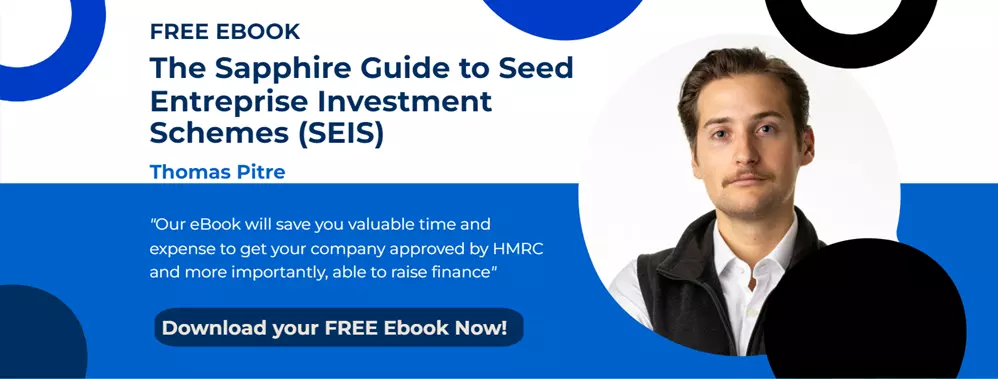In the first of our new blog series looking at the people behind the funds we manage, we speak to Pippa Gawley, founder of Zero Carbon Capital, who launched the Zero Carbon Fund at the end of 2019.
Find out more about the Zero Carbon Fund.
The information provided by the interview are the opinions of the interviewee, Pippa Gawley. The following blog interview should not be construed as investment advice.
The Zero Carbon Fund, as the name suggests, has a powerful objective:
“The Fund seeks to invest in early-stage companies that qualify for the Enterprise Investment Scheme (EIS) tax relief who are on a mission to address climate change through technology innovation. The Fund will work with Zero Carbon Capital Limited to invest in teams with ideas that could scale to reduce greenhouse gas emissions by half a gigaton per year.”
%20(2).jpg?width=180&name=2.1%20Pippa%20headshot%20(1)%20(2).jpg) Pippa is a clean-tech investor in early-stage businesses in the US and UK creating scientific innovations to fight climate change and is passionate about accelerating the zero-carbon transition. We spoke to her about her motivations behind the development of the Fund and the story of its evolution to launching for fundraising earlier this year.
Pippa is a clean-tech investor in early-stage businesses in the US and UK creating scientific innovations to fight climate change and is passionate about accelerating the zero-carbon transition. We spoke to her about her motivations behind the development of the Fund and the story of its evolution to launching for fundraising earlier this year.
First of all, it’s hard to talk about anything at the moment without including the impact of the COVID. How has the current situation changed the way you are thinking about climate change? It’s good to see that the pollution levels are coming down.
The impact of COVID on all of us is just huge. From those whose health and lives have been directly affected by the infection, to the loss of social and economic well-being caused by the necessary response. I am very grateful that my immediate family is safe and healthy, and am working to help those in my community any way that I can. All of our primary focus right now should be on responding to this challenge and getting through it together.
In terms of climate change, it’s true that greenhouse gas emissions and pollution are down around the world, from the reduced transport and industrial activity and I think we can also see some positives in how quickly we are able to change our behaviour in the face of a crisis. That said, none of the changes we are making right now are sustainable solutions to the climate crisis, nor are they intended to be!
On thing that I think will be important is that as we move past COVID and governments start to think about how to revive and stimulate the economy, there is a real opportunity to build a more sustainable normal by targeting green growth, growing clean sector jobs and incentivising companies to rebuild with the environment in mind.
COVID has taught us all about “flattening the curve” to keep cases within the infrastructure limits we have, now we need to flatten the curve of carbon emissions to stay within the limits of nature’s capacity to absorb them, and make sure we develop a new way of living that supports a healthy population and a healthy planet, as well as a healthy economy.
Pippa, you have always had an interest in ‘green’ energy and emerging technologies with impressive educational qualifications spanning the University of Cambridge, Oxford Said Business School and Stanford University and with roles in product development and research and design prior to angel investing in both the UK and US. Has everything in your career so far been leading to the launch of The Zero Carbon Fund or is it an idea that evolved as a product of your experience in these roles?
Pippa: It’s definitely been a journey! I’ve been interested in the way we can harness the power of business to solve big issues that we face as a society for a long time. It always felt to me that companies which help us address big systemic issues should also be very successful from a financial perspective. It has been really encouraging to see this thesis play out over the last couple of decades both as corporations began to understand the value of stakeholders outside of just shareholders and as investors started to look at impact as an indicator of potential.Over the last 10 years I have personally become increasingly concerned about our lack of progress in fighting climate change. As a big believer in market solutions I wanted to find a way to contribute through them. When I realised there were so many interesting solutions in the pipeline that needed capital I started personally investing in the space. Over the last few years it’s become clear there is just enormous need for capital here and that represents a great opportunity. That was the genesis of the fund, to try to bring more investors into this space.
How difficult has it been to get to this stage and what major obstacles have you faced along the way in terms of getting the support and commitment required to launch a Fund with such an ambitious vision?
Pippa: As an individual investor, I’d invested in some funds, but never really given much thought as to what it takes to set up and run them. Well, I’ve had a pretty good crash course in that over the last six months.The great thing about being here in the UK is that there are so many ways to approach this. We chose the EIS Fund route as it matched with the early stage investments we wanted to make, is tax-advantageous for our investors and has a great ecosystem of companies that are set up to help EIS funds get off the ground - like yours! The hardest part of that initial stage was really choosing who to partner with. We knew it would be critical for the success of the fund to find an investment manager who had a lot of experience and credibility, a reputation for integrity, and would work hard alongside us to make great investments in the right way. It all came together when we chose to work with Sapphire as you have this great track record, you know everyone, and you can guide us past some of the pitfalls. Since launching, it’s all been about working to bring investors on board. While that is hard work, I’ve been really impressed by the openness of the investor community. Being a first-time fund manager does make some of those conversations more difficult, but we are lucky to have a very strong angel portfolio to point at in terms of our track record, and of course the partnership with Sapphire to reassure them about the nuts and bolts of the fund management and regulatory side. With the recent devastating bushfires in Australia and the unprecedented floods in East Africa at the end of 2019 being linked to climate change, even The World Economic Forum putting the dangers to business of climate change centre stage at Davos in February, the case for taking urgent action to address and find solutions to the factors contributing to climate change could not be more timely. Do you feel that world leaders and big business are finally taking notice and that now is the time to really drive the ‘green revolution’?"
With the recent devastating bushfires in Australia and the unprecedented floods in East Africa at the end of 2019 being linked to climate change, even The World Economic Forum putting the dangers to business of climate change centre stage at Davos in February, the case for taking urgent action to address and find solutions to the factors contributing to climate change could not be more timely. Do you feel that world leaders and big business are finally taking notice and that now is the time to really drive the ‘green revolution’?"
Pippa: It is happening. Slowly! I think our confidence that the right things will happen in the long term is gradually growing, but we do need to see a lot more concerted and decisive action from the government and industry. Public support has really swung behind action on climate change, due to many factors including the Greta effect and David Attenborough’s tireless work, reaction to the global natural disasters and greater publicity for the work of international bodies such as the UN’s Intergovernmental Panel on Climate Change (IPCCC), and the amazing Committee on Climate Change here in the UK. Company leaders have got the message from the public that they can’t continue with the status quo. I think they are also heavily influenced by the prospect of tightening regulation, the negative media coverage - no CEO wants Extinction Rebellion glued to their front door - and by the increasing pressure from shareholders and financial regulators to disclose their financial risks relating to climate change. He may not have caught the public imagination as much as Greta, but I’d argue that Bank of England chief Mark Carney has done more to shift the board-level agenda with his relentless message that companies ignoring climate risk will go bankrupt.
The mission of The Zero Carbon Fund is to back entrepreneurs with innovative technologies that will accelerate the goal of reducing carbon emissions. You must meet many exciting and passionate entrepreneurs who share your vision of a zero-carbon future. Are you reassured that these companies and individuals potentially have the emerging technologies that could provide a real chance at starting to combat and reduce our carbon emissions and are you hopeful that there is still time to make a difference?
Pippa: We’re definitely seeing a lot of entrepreneurial activity in this space which is great, and it is increasing with this sea change in public support for climate action. Scientists and entrepreneurs are more motivated and able to work on finding solutions with the influx of more grants, competitions and capital at all levels. I saw this a lot in the tech world in California and am now seeing signs of similar progress in this space. In my discussions with our partners at Universities I can see there is already a lot of fundamental science and engineering work happening, so the main challenge will be to help those teams scale and commercialise. I’m confident we can do that.
The UK became the first major economy to pass a law requiring the UK to bring all greenhouse gas emissions to net zero by 2050. How achievable do you believe this target is given current efforts and how do you think the UK is positioned globally in the development of the technological innovations required to make the changes really needed?Do you think the recent government announcement bringing forward the ban on selling new petrol, diesel or hybrid cars in the UK from 2040 to 2035 goes enough towards helping the UK meet these targets?
Pippa: It is achievable, but there are many challenges and up till now, we haven’t made the fastest start. We’re going to need to accelerate efforts dramatically if we are serious about making it happen. I welcome the tightening of government goals for moving away from petrol cars and coal burning, this definitely sends the right signals to companies, but I’d like to see much more. Essentially we are going to need to see accelerating change in policy that supports this transition over the next few years.Setting net zero 2050 targets is in vogue right now, but we need to see the wheels in motion to actually deliver them. It’s simply not credible for the UK government to set this target, and still be signing off on planning permission for fossil fuel-fired power stations, and continuing to allow the burning of coal in this country. We have the alternatives now, they are cost competitive, the UK could be in a position to lead the world with this transition. Onshore wind is now the cheapest form of energy generation available in the world, and the newest farms are achieving greater than 60% capacity. For companies as well - for a company like BP to set an ‘ambition’ to be net zero by 2050 and then to say in the next paragraph that they are increasing oil and gas production by 20%, it just doesn’t add up. At root it’s pretty simple - every day that we delay these changes, the effects of climate change get worse. We have the choice between paying for this transition, or paying many times more for increasingly severe and frequent extreme weather events.
Zero Carbon Capital themselves have been the first to invest in the Fund, and with a promise to waive initial and recurring fees for both investors and investee companies, there is a real drive to give potential companies the best chance possible to succeed, are you optimistic that the will, and more importantly, the investment, is there from both the private and public sectors?
Pippa: Yes. With this fund we are passionate about getting as much money as possible into the hands of the companies that can address this challenge. That’s why we decided to take on the risk of not charging ongoing fees and to align all of our return with those of investors.There is a thriving and growing scene for early stage cleantech in the UK and I’ve been lucky enough to build great relationships with many folks who will be both deal-flow partners and whom we will invest alongside. And then when you start to look at later stages, funds like Bill Gates’ Breakthrough Energy Investments and many others are coming into the market to provide that growth stage capital. And of course we’re seeing both corporates and institutional investors, who often provide the latest stage of capital, really embrace the need to include climate risk in their decision. The most recent letter from Blackrock is a great example of this trend.
The Zero Carbon Fund is an alternative investment fund investing in early stage companies that qualify for the Enterprise Investment Scheme (EIS) tax relief - do you believe the EIS scheme has opened the door to investment to companies and start-ups who share your goal of addressing climate change that otherwise would struggle to get the investment they need to advance their technological innovations? Is this sort of government support essential if we are to make real in-roads in the climate crisis?
Pippa: Absolutely. Anything that encourages investors to provide the seed stage capital that is needed in this space is highly welcome. EIS is a great vehicle in this space in particular as it targets the funds at the earliest stages which will be the solutions we need in 10 years time.
Finally Pippa, you have worked alongside many experts in the field of early-stage climate innovation and impact investment, and have been a member of several angel networks including E8, Clearly So Angels and Social Venture Circle. What advice would you have for any start-up companies and entrepreneurs attempting to make their mark and gain investment in their vision for a climate change revolution?
Pippa: I think the number one piece of advice is to be really focussed and diligent about the scale of impact you are aiming for. When you are looking at your technology think about how it will scale up in the real world, how you’ll get it to market and where the money to buy it will come from. What are you going to need to do to optimise all of those things, and if they go really well, do you have the potential to remove or avoid half a gigaton of CO2e from the system? Companies that can paint that picture are very attractive to investors, and have a great chance of making a real impact on the world..jpg?width=600&name=Zero-Carbon-Capital-Logo-Navy-text-RGB%20(3).jpg)

The information provided by the interview are the opinions of the interviewee, Pippa Gawley. As such, it should not be construed as investment advice or a financial promotion.
Investing in start-ups and early stage businesses involves risks, including illiquidity, lack of dividends, loss of investment and dilution. It should be done only as part of a diversified portfolio after taking professional advice. SEIS/EIS investments are targeted exclusively at investors who are certified as qualifying investors, who understand the risks of investing in early stage businesses and can make their own investment decisions. Sapphire Capital Partners LLP is the Investment Manager of the Zero Carbon Fund. Sapphire Capital Partners LLP takes no responsibility for the above information or for any recommendations, opinions and inferences made by the interviewee. Sapphire Capital Partners LLP is unable to provide investment advice and this interview is not directed at or intended for publication or distribution to any person (natural or legal) in any jurisdiction where doing so would result in contravention of any applicable laws or regulations.
Written by Aisling Bell
 Aisling assists in setting up and managing funds, focusing on property, private equity and venture capital. Contact Aisling by email at: aisling@sapphirecapitalpartners.co.uk or view her profile here.
Aisling assists in setting up and managing funds, focusing on property, private equity and venture capital. Contact Aisling by email at: aisling@sapphirecapitalpartners.co.uk or view her profile here.


.jpg?width=155&height=155&name=20211005-_LM17073-2%20(2).jpg)